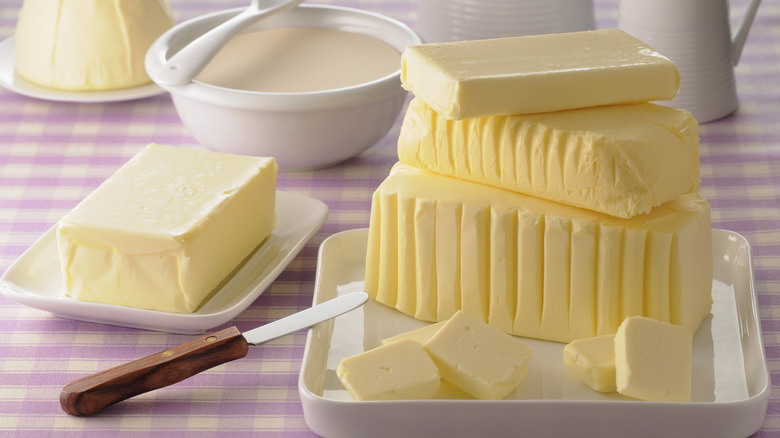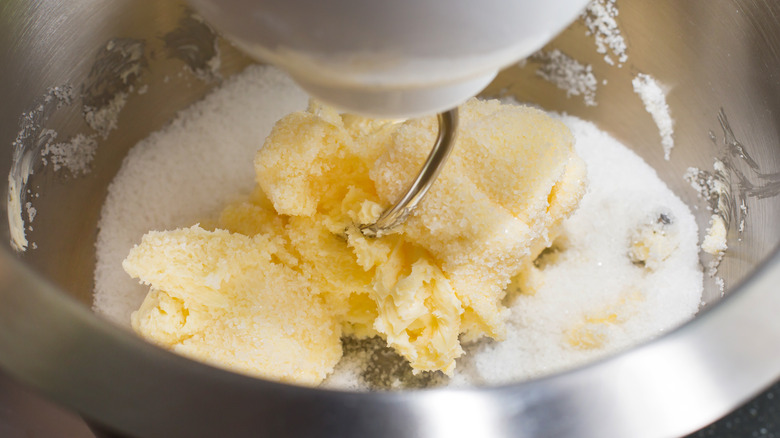How Much Salt Is Really In Salted Butter?
Have you ever accidentally bought a pound of salted butter and wondered how much salt each stick contains and how much it varies from unsalted butter varieties? While salted butter is good for spreading on homemade crusty rye bread or fluffy dinner rolls, when it comes to cooking and baking, it can be a bit ambiguous how much sodium is actually in a stick. Luckily, we have answers.
Salted butter typically contains about ¼ teaspoon of salt or about 575 to 600 milligrams of sodium per half-cup stick. That's about 75 milligrams of sodium per tablespoon. However, it's important to note that the amount of salt can vary among different butter brands. Many salted butters contain ¼ teaspoon per stick, but others can have up to double that amount. You can anticipate your salted butter's sodium to fall within this general ¼ to ½ teaspoon range, though it's usually safe to err on the lighter side and assume there's a quarter of salt teaspoon per stick. Unsalted butter, as the name implies, doesn't contain salt, making it the more customizable choice, best for recipes where you want to dial in the salt levels yourself.
When to use salted versus unsalted butter
Butter is an ingredient most people can agree adds a depth of flavor and richness to food, but when it comes to buying salted versus unsalted butter, the debate can adamantly move to one side or the other. In essence, salted butter is made the same way as unsalted butter — by churning pasteurized cream, then draining off liquid buttermilk so that a solid mass of buttery fat remains. But with salted butter, salt is added in after the churning process to add flavor and extend the final product's shelf life.
Salted butter lovers often boast its tasty appeal slathered on steamy baked potatoes and toasted English muffins. Unsalted butter varieties, however, are ideal for baking or cooking projects where the precision of ingredients is key since you can add salt separately to taste. Most baking recipes call for unsalted butter for this reason. Since salted butter usually contains more water (about 10 to 18% more than unsalted butter), its extra moisture can negatively impact the texture of certain baked goods, like muffins, cakes, or quick breads, where gluten development is important. Unsalted butter (which sometimes contains lactic acid as a preservative) still typically has a shorter shelf life than salted, so if you're looking for butter to keep on a dish in the fridge and use for a while as a flavorful spread, salted butter may be your choice.
How to substitute one butter for the other
If you do end up buying salted butter by accident for baking or cooking, have no fear — it's pretty easy to swap one butter for the other in a pinch. Most home cooks can assume their stick of salted butter contains about ¼ teaspoon of salt when subbing it in and out of recipes. This means when making a batch of cookies or cake batter if you're tossing a stick of salted butter into the mixer to cream with granulated sugar, you'll reduce the amount of salt you add to the recipe by a quarter teaspoon. But as a word of caution: Depending on the brand and the amount of butter your recipe calls for, your cookies could come out saltier or under-salted than intended. Their texture may also be altered due to a slightly higher water content.
On the flip side, if you have unsalted butter on hand and want to make a delectable flavored spread for bread, you can always whip softened butter with a quarter teaspoon salt per stick. At this point, you could add other ingredients and flavorings, such as rosemary or a bit of honey, for a savory-sweet twist. And if you forgot to buy the butter altogether, yes, it is possible (and easy) to make your own by vigorously whipping heavy cream until it starts to curdle. Salted, unsalted, or homemade, you can usually count on quality butter to elevate your dish.


